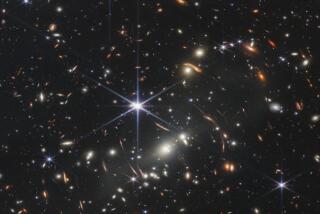Theologians Find Awe in Possibility of Life on Mars
- Share via
If there is intelligent life on other planets, the first question evangelical theologian Tony Campolo would ask the other beings is: What can you teach us about God?
Far from worrying that the recent NASA discovery that life may have existed on Mars will shake the foundations of their faith, many religious leaders and theologians say the news should be greeted with a sense of humility and awe at the infinite creative potential of God.
This is not the 16th century, when Christian leaders condemned Copernicus and later Galileo for teaching that the Earth was not the center of the universe.
Today, scientific advances--including the idea that a potato-sized meteorite that blasted off Mars 15 million years ago contains physical and chemical traces suggestive of life--are more likely to be greeted as evidence of the unlimited power of God, religious leaders say.
“We believe a God who is capable of creating one world is capable of creating many worlds,” said Rabbi Alexander Schindler, former head of the Union of American Hebrew Congregations. “It does not change our fundamental faith. It doesn’t touch it in the slightest.”
Although the NASA results are preliminary--and are based on tiny, nearly 4-billion-year-old microbes--they are tantalizing. And prominent religious thinkers are not immune from the same flights of imagination about extraterrestrial life that have gripped so many others.
David Byers, executive director of the Committee on Science and Human Values of the National Conference of Catholic Bishops, said he has been thinking about it since he was a boy.
“I remember, when I was about 10 or 12, thinking if I ever ran into an alien, my first question would be: ‘Who’s Jesus?’ and see what they said,” Byers recalled.
Rabbi James Rudin of the American Jewish Committee said the recent discovery calls for “a little galactic modesty on the part of not only the scientific community, but also the religious community. . . . How do we know that we are the only form of life?”
Few theologians expressed doubt that God would have a relationship with whatever beings were able to exist on other planets.
“Whatever is there is God’s creation,” said the Rev. Robert Russell, a physicist and United Church of Christ minister and founder of the Center for Theology and the Natural Sciences in Berkeley. “I would imagine God would be as interested in being in communication . . . with that form of life as God is with Earth, with terrestrial beings.”
The growing religious awareness that humanity has a responsibility to care for the Earth’s resources should extend to space, said Russell, who holds advanced degrees in physics and theology. Humans should be careful not to contaminate any alien life forms, he said.
If humans encountered intelligent aliens, we should “share what we have found about the richness of altruism, the richness of compassion, and science,” Russell said, citing current models of interfaith dialogue. “I would think it would be glorious.”
The idea of bringing--or seeking--”truth” from inhabitants of other worlds carries a host of questions with it. Scholars inevitably draw parallels to colonial-era Christian missionaries, whose notions of Western superiority seemed inseparable from their Gospel.
That evangelizing was “at least as arrogant and hegemonic in its approach as it was helpful,” said David Hein, chairman of the department of religion and philosophy at Hood College in Frederick, Md.
“Assuming the existence of sentient beings on another planet, the work of the missionary should first of all be to listen, to demonstrate love,” Hein said. “The other reality may have at least as much to teach us as we have to teach them.”
While Christianity has a stronger evangelistic impulse than most major religions, the question of alien life poses questions for other faiths as well.
The discovery of other life “would serve to humble people a little more, let them not think that this planet is the center of the universe,” said Arthur Green, professor of Jewish thought at Brandeis University in Waltham, Mass.
Jews would be impelled “to reach out to them in friendship. . . because they are fellow creatures of God created in his image,” said Schindler, the former head of the Union of American Hebrew Congregations.
The notion of alien life also “fits in quite nicely with traditional views” of Buddhism, said Richard Payne, dean of the Institute of Buddhist Studies in Berkeley. Buddhist cosmology puts the Earth as “just one small part of a larger inhabited reality” filled with a variety of sentient beings, he said.
The core Buddhist truths--pointing the way to overcoming universal suffering through correct thinking, ethical behavior and meditation--would hold true anywhere in the cosmos, Payne said.
But Buddhism would not foster interplanetary missionary activities. “Certainly there is the notion of making the teachings available,” Payne said. “But there is no big motivation to go out and convert people.”
Indulging his own imagination, Campolo, a popular Christian author and preacher, said he could envision a scenario where God--tired of the mess human beings had created in this world--would send beings from another planet to help people learn to love one another.
“We’ve always looked at ourselves as people sending out missionaries,” Campolo said. “Maybe we need to receive a few at this point in history.”






